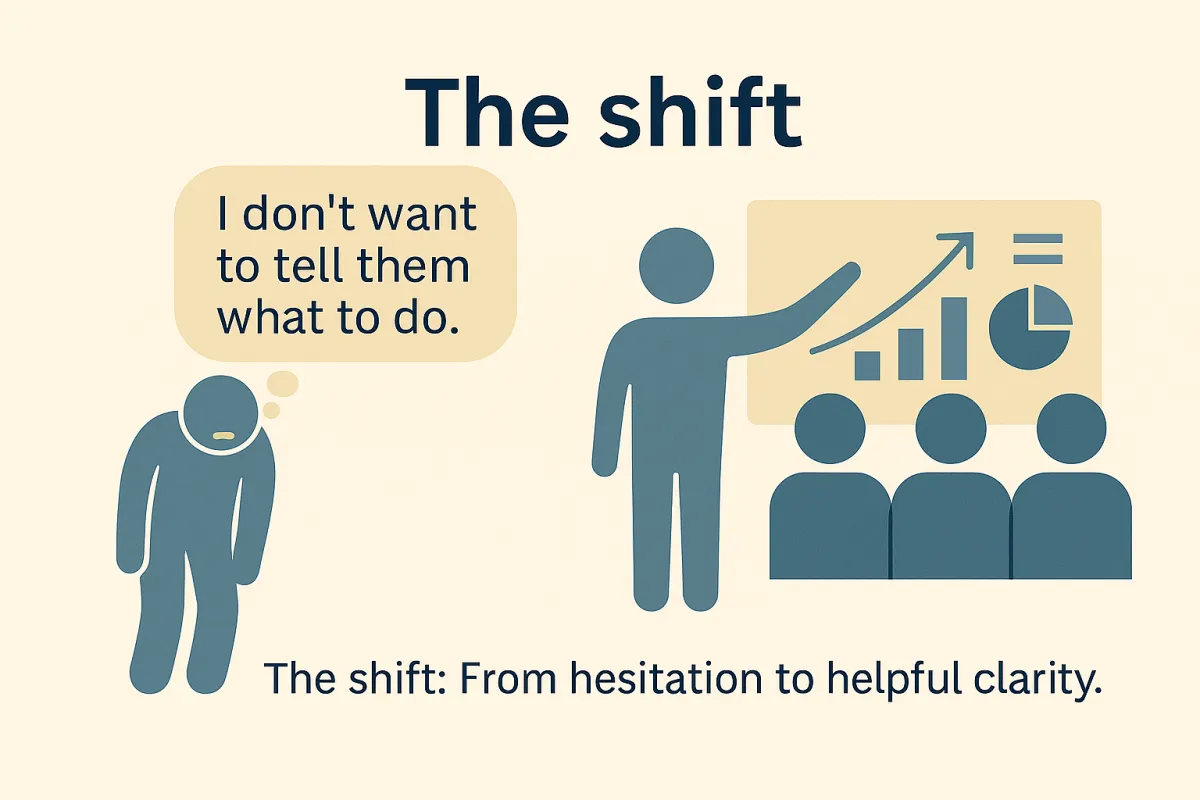
The Gut Reaction That Needed an Overhaul
The Gut Reaction That Needed an Overhaul
“They’re my friends. I don’t want to tell them what to do.”
That was my gut reaction when I was offered my first management role.
It wasn’t fear of responsibility or workload.
It was fear of hurting relationships.
I was going to be managing people I had lunch with.
People I confided in.
People I liked.
And I didn’t want to “boss” anyone around.
When I asked, “Why me?”, my manager shared the strengths they saw in me and how those strengths could benefit the team and the company.
I was still skeptical.
I asked for time to decide.
One Night. One Thought Loop. One Mindset Shift.
That night, I went home and thought about the amazing managers I had worked with.
Each of them—different in style, background, and strengths—had made a lasting impact on me.
Why?
Because they led with clarity.
Not control. Not cheerleading. Not ego.
Clarity.
And that’s when I realized something humbling:
I had never truly understood what management meant.
Even after working with the best of managers, it only clicked when I was presented with the opportunity to be one myself.
And my gut reaction was wrong.
What Management Is Not
· It’s not about bossing people around
· It’s not about micromanaging every move
· It’s not about keeping everyone happy all the time
People don’t need to be controlled—or constantly comforted.
They need a clear path forward, a sense of shared purpose, and a manager who helps them do their best work.
What Management Is
· It’s about creating alignment
· It’s about facilitating honest conversations
· It’s about leading with care, clarity, and consistency
That night, I stopped thinking of my role as “telling people what to do.”
Instead, I started thinking of it as a responsibility to build the conditions for clarity and success.
This mindset shift wasn’t just helpful—it was transformative.
From Hesitation to Helpful Clarity
Eventually, I accepted the position with the caveat that I’d try it for a year and see if I liked the role.
You might be in the same place I was—hesitating to step into management because it feels like stepping above your peers.
But here’s the truth:
You’re not stepping above your friends.
You’re stepping into a role that helps the whole team thrive.
Let’s walk through that shift together.
From: “I Don’t Want to Tell Them What to Do”
To: “I Want to Help Us Do Our Best Work”
This shift is subtle but powerful.
It’s about moving from:
Reluctance → Responsibility
Avoiding discomfort → Creating alignment
Friendship for comfort → Leadership with care

Three Anchors That Helped Me
Here are three small practices that anchored me during this transition:
1. Clarity Over Control
I started by asking:
What are we trying to accomplish?
Who’s responsible for what?
How will we know we’re making progress?
Then I made that visible. On whiteboards, in 1:1s, during check-ins.
📌 Clarity isn’t a one-time memo. It’s a habit.
2. Conversations Over Assumptions
I used to assume that giving feedback would damage relationships.
Turns out, silence damages trust faster.
I started saying things like:
“Can I share an observation?”
“Here’s something I appreciate—can we build on it?”
“Let’s make sure we’re not avoiding a hard truth here.”
📌 Honest doesn’t have to mean harsh. It means human.
3. Consistency Over Chaos
Great managers don’t act on mood. They act on mission.
I created small, repeatable systems:
Weekly 1:1s with a shared doc
A team check-in that rotated ownership
A visible board of goals, blockers, and wins
📌 Consistency creates psychological safety. It tells the team, “I’ve got your back—even on hard days.”
What I Gained by Letting Go of the Fear of Losing Friendships
Once I stopped clinging to the idea that I couldn’t lead my friends, I gained something far better:
Trust grounded in transparency
Respect earned by showing up with care
Momentum from having shared goals, not just shared lunches
It didn’t mean we stopped being friends.
It meant our relationships matured.
A Simple Framework: The Shift
Here’s a visual that might help:

Final Thought: Uplift, Don’t Control
I remind myself often:
Our job as managers is to uplift the team, not control them.
You don’t have to have all the answers.
You just have to create the space for better ones to emerge.
So if you're stepping into a new role—especially managing peers—don’t fear the shift.
Embrace it.
Learn from it.
Lead with care.
You’ve got this.
Want to Go Deeper?
This blog is part of my Everyday Leadership series for aspiring and new managers.
I help people navigate the messy, human side of management with simple, actionable tools.
If this post resonated with you, DM me or subscribe to my newsletter, The Leading Mindset, for weekly prompts, tools, and real-life leadership lessons.
📩 Or reach out if you want help transitioning from peer to manager—I'd be happy to chat.
